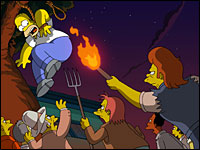(1) Michael Erard, "A 10,000-year-old word puzzle", Globe and Mail, 4/14/2008: an excellent account of recent work on the relationship between the Na-Dene languages of western North America and the Yeniseic languages of Siberia, briefly described in a post last month by Heidi Harley ("Big news from the Arctic Circle", 3/15/2008).
The article's sub-head ("A linguistic 'long ranger' chases down an ancient language in Siberia and discovers a surprising connection to modern languages in North America") is a bit misleading, as Michael Erard has pointed out to me in email, since "long ranger" is a term that has come to refer to a particular group of historical linguists that Edward Vajda definitely does not belong to. Newspaper headlines, main and sub-, are not provided by the writers of the articles that they introduce, but rather by editors who typically know little or nothing about the subject under discussion. (A cross-reference to the standards of intellectual sausage-making is appropriate at this point.)
(2) "Mark Peters on Eggcorns", Good Magazine, 4/12/2008:
So next time you see an eggcorn, don’t curse the heavens. Refrain from removing your eyeballs with a spork. Please don’t start a blog about kids these days and how they’re spilling Red Bull all over our nice dictionaries. These mind-bottling, jar-dropping mistakes show people are smart—not stupid—and this process of the masses’ getting it wrong until it becomes right is common, ongoing, and unstoppable.
[Update — Mark Young writes:
The Globe and Mail article you mentioned in this morning's LL has had its sub-head changed. Someone at the G&M reads LL? Or maybe someone else noticed the same thing you did….
]
 A couple of days ago, Andrew Mueller at the Guardian tossed some bleeding gobbets into the crowd of ravening
A couple of days ago, Andrew Mueller at the Guardian tossed some bleeding gobbets into the crowd of ravening 
